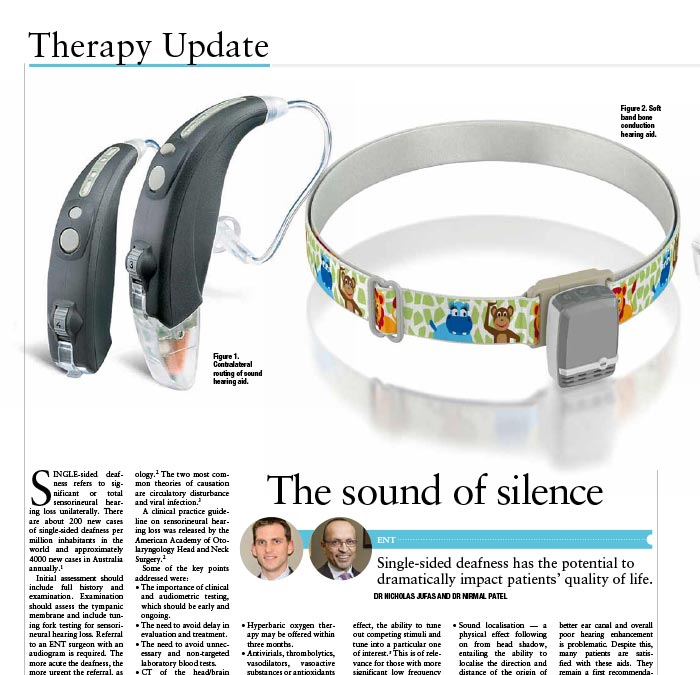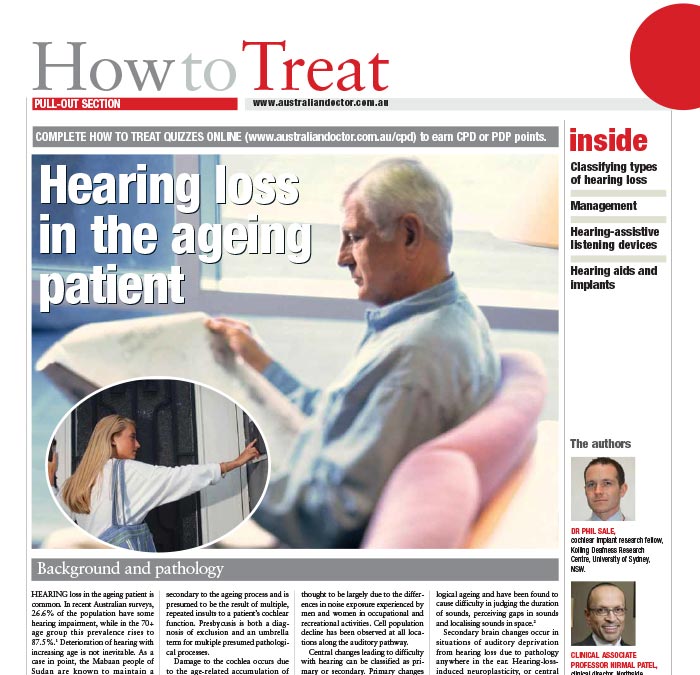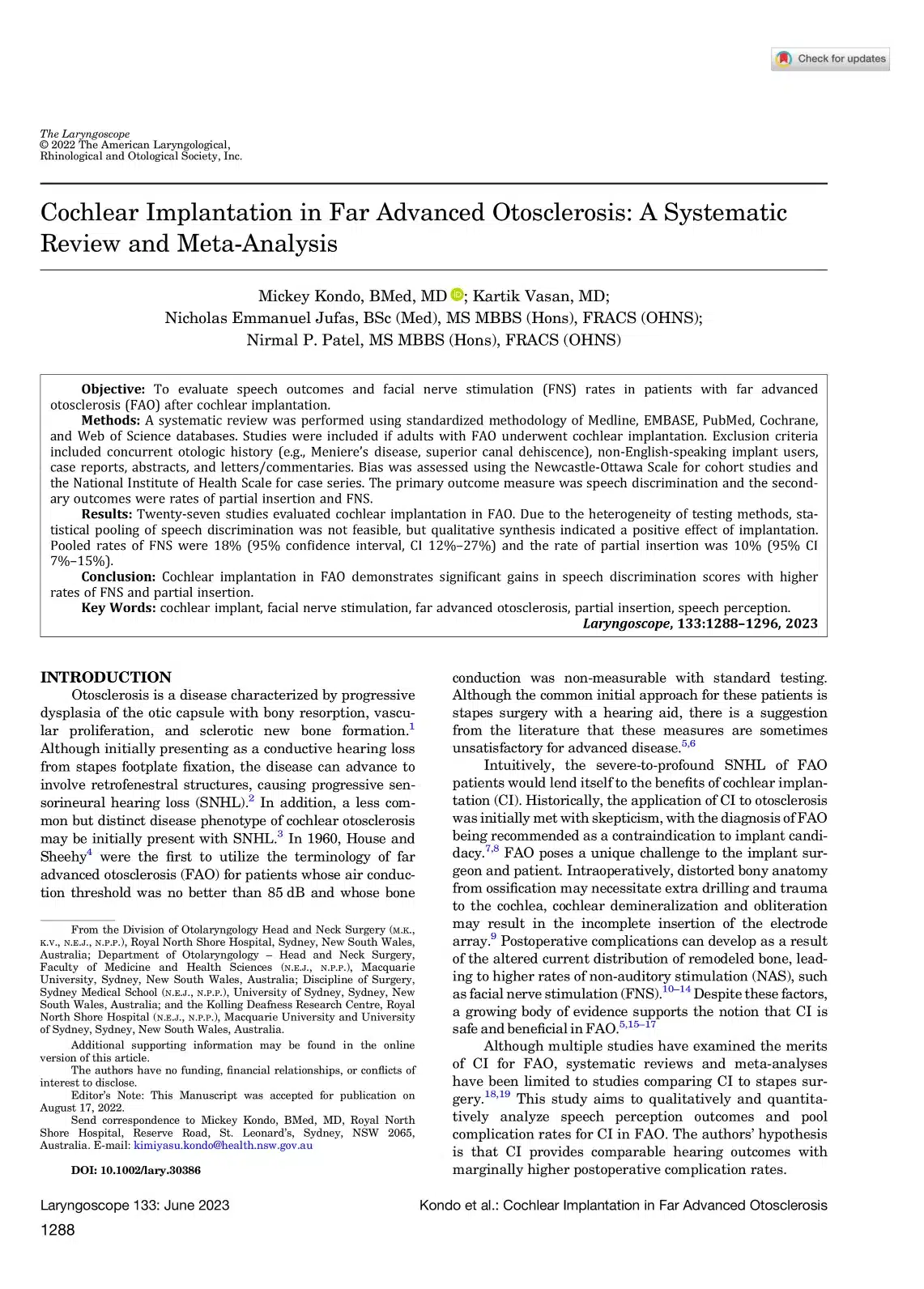Cochlear implants are now routine treatment for adults where hearing aids are no longer working or for recent single sided deafness.
When hearing aids are no longer providing adequate hearing, a patient can hear loud enough but does not have clarity of words. This loss of clarity occurs from damage to the fine hair cells in the cochlea, that convert mechanical to electrical energy. A cochlear implant bypasses the damaged hair cells in the inner and directly stimulates the cochlea nerve.
Single sided deafness occurs in 1 in 10,000 people and may have a devastating effect on quality of life from the loss of hearing and tinnitus. If the patient fails trials of other alternatives such as the CROS (contralateral routing of sound aid) or Bone anchored Hearing aid, then a cochlear implant may be an excellent option.
The procedure is generally a day surgery operation with 3-5 days off work. The cochlear implant is switched on 2-3 weeks after surgery, once the surgical swelling settles.
Clinical Professor Nirmal Patel has been the Clinical Director of the Northside Cochlear Implant Program in Sydney since 2007. Nirmal has performed hundreds of cochlear implant surgeries using all three current brands of implant.
For more information on cochlear implants, head to northsideaudiology.com.au.
More information about Cochlear Implants:
Factors Influencing Cochlear Implant Outcomes
Patient Factors:
Age at Implantation: Younger age at the time of surgery is associated with better outcomes. Hashemi et al. found that age at surgery significantly impacts auditory and speech outcomes in pediatric patients. Similarly, Walia et al. noted that age is a critical factor in adult CI performance.[1][2]
Onset and Duration of Hearing Loss: Longer duration of deafness before implantation is linked to poorer outcomes. Warner-Czyz et al. highlighted that longer duration of profound hearing loss negatively affects postoperative outcomes in children. Bartholomew et al. also emphasized that duration of hearing loss is a significant predictor in adults.[3][4]
Neurological and Comorbid Conditions: Neurological problems and other comorbidities can adversely affect CI outcomes. Dang et al. demonstrated that patients with severe comorbidities had worse speech outcomes compared to those without comorbidities.[5]
Disease Factors:
Inner Ear Malformations (IEMs): Patients with IEMs may experience less favorable outcomes. Shah et al. reported that IEMs are associated with higher rates of intraoperative complications and poorer audiological outcomes.[3]
Genetic Etiology: Genetic factors can significantly influence CI outcomes. Tropitzsch et al. found that mutations affecting neural components of the cochlea lead to poorer performance.[6]
Surgery Factors:
Surgical Technique: Proper surgical technique is crucial for optimal outcomes. Kim et al. noted that device failure and surgical complications are significant factors leading to revision surgeries.[7]
Electrode Array Insertion: The depth and approach of electrode insertion can impact outcomes. Walia et al. found that angular insertion depth and ECochG-TR measurements are important predictors of CI performance.[2]
Audiological Factors:
Preoperative Hearing Aid Use: Consistent use of hearing aids before implantation is associated with better outcomes. Hashemi et al. emphasized the importance of hearing aid use in improving auditory and speech outcomes in children.[1]
Residual Cochlear Function: The health of the cochlea and auditory nerve is critical. Walia et al. validated ECochG-TR as a measure of cochlear health, which strongly correlates with CI performance.[2]
Cognitive Function: Cognitive abilities also play a role in CI outcomes. Walia et al. found that cognitive function, as measured by MoCA, is a significant predictor of performance in noise.[2]
In conclusion, the success of cochlear implants is multifactorial, involving patient demographics, disease etiology, surgical technique, and preoperative audiological conditions. Addressing these factors through careful patient selection, surgical planning, and postoperative management can help optimize CI outcomes.
References
- Prognostic Factors in Pediatric Cochlear Implant: An Outcome-Based Study. Hashemi SFM, Rajati M, Yousefi R, et al. European Archives of Oto-Rhino-Laryngology : Official Journal of the European Federation of Oto-Rhino-Laryngological Societies (EUFOS) : Affiliated With the German Society for Oto-Rhino-Laryngology – Head and Neck Surgery. 2023;280(12):5319-5327. doi:10.1007/s00405-023-08054-1.
- Factors Affecting Performance in Adults With Cochlear Implants: A Role for Cognition and Residual Cochlear Function. Walia A, Shew MA, Lefler SM, et al. Otology & Neurotology : Official Publication of the American Otological Society, American Neurotology Society [And] European Academy of Otology and Neurotology. 2023;44(10):988-996. doi:10.1097/MAO.0000000000004015.
- American Cochlear Implant Alliance Task Force Guidelines for Determining Cochlear Implant Candidacy in Children. Warner-Czyz AD, Roland JT, Thomas D, Uhler K, Zombek L. Ear and Hearing. 2022 Mar/Apr;43(2):268-282. doi:10.1097/AUD.0000000000001087.
- On the Difficulty Predicting Word Recognition Performance After Cochlear Implantation. Bartholomew RA, Hoffman SE, Juliano AF, et al. Otology & Neurotology : Official Publication of the American Otological Society, American Neurotology Society [And] European Academy of Otology and Neurotology. 2024;45(5):e393-e399. doi:10.1097/MAO.0000000000004176.
- Individual Patient Comorbidities and Effect on Cochlear Implant Performance. Dang S, Kallogjeri D, Dizdar K, et al. Otology & Neurotology : Official Publication of the American Otological Society, American Neurotology Society [And] European Academy of Otology and Neurotology. 2024;45(4):e281-e288. doi:10.1097/MAO.0000000000004144.
- Variability in Cochlear Implantation Outcomes in a Large German Cohort With a Genetic Etiology of Hearing Loss. Tropitzsch A, Schade-Mann T, Gamerdinger P, et al. Ear and Hearing. 2023 Nov-Dec 01;44(6):1464-1484. doi:10.1097/AUD.0000000000001386.
- Extended Preoperative Audiometry for Outcome Prediction and Risk Analysis in Patients Receiving Cochlear Implants. Rieck JH, Beyer A, Mewes A, Caliebe A, Hey M. Journal of Clinical Medicine. 2023;12(9):3262. doi:10.3390/jcm12093262.
OTHER DISEASE PROCESSES
OTHER DISEASE PROCESSES
Got a question you would like to ask Dr Nirmal Patel?





